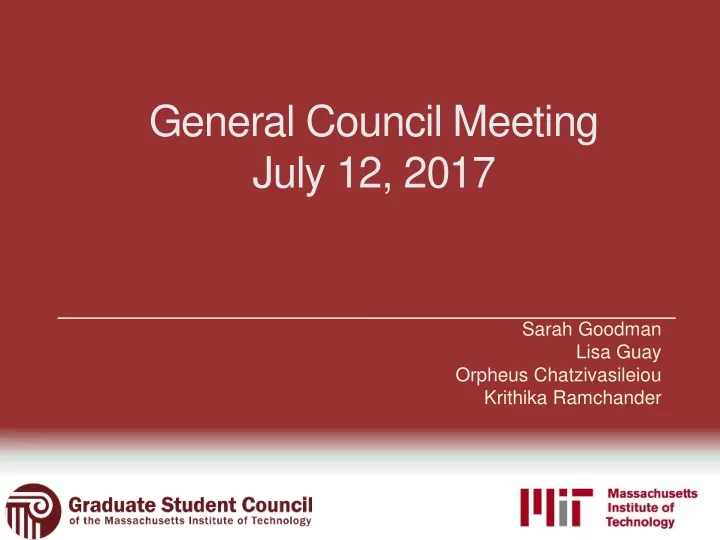

General Council Meeting July 12, 2017 Sarah Goodman Lisa Guay Orpheus Chatzivasileiou Krithika Ramchander
New Faces • Welcome to General Council!
Quorum check
Approve June Minutes • Found on GSC website and GCM announcement email
70 Amherst St.
70 Amherst St. • The undergraduate dorm formerly known as Senior House will become a graduate dorm for this upcoming academic year. • Timeline for how long it will remain a grad dorm is uncertain. • Chancellor Cindy Barnhart and Vice President for Student Life Suzy Nelson recognize that the addition of 70 Amherst will not suffice to meet the current need for graduate housing. • They will be working with the graduate community to support students moving into 70 Amherst and to expand grad student housing stock
Decision making process • Letter to undergraduate student body from the Chancellor • “Unfortunately, …it became clear this spring that the turnaround had failed. We learned that dangerous behavior …was taking place in the house and … that the community knew about the behavior, but was neither stopping that behavior on its own, nor turning to us for help in stopping it.” • “To our great regret, the [turnaround] plan was also met with intensive efforts to perpetuate and reimpose Senior House, thus undermining any chance for a new community to succeed. • We reluctantly came to the conclusion that the only path left to us was for the building to house graduate students. • The GSC was not involved in the decision to turn Senior House into grad housing
Moving to 70 Amherst • Listed on graduate housing website • Housing lottery extended to Thursday to give grad students the opportunity to rank 70 Amherst as their preference. • Students who have already been placed in the lottery can request to move to 70 Amherst. • Students already living on- or off-campus can request to move to 70 Amherst. • Assignments in 70 Amherst will be made through a lottery.
Structure of 70 Amherst • All single rooms - no shared rooms • Air conditioning • Smoke-free, pet-free • 128 single rooms, with community bathroom and kitchen in hallway • Ratio of 4.3 students per toilet. • 5 single apartments with private bathroom, living room, and kitchen • Rooms are furnished
What happens to the undergrads? • Undergrad dorms already crowded because of New House renovation • Some undergraduates will be placed in graduate dorms • Most likely less than 60 • Undergrads are being offered $3000 credit or a 10 meal per week meal-plan as an incentive to move to grad housing • Undergrads will participate in the lottery system - they rank their preferences, and may or may not get a spot
What happens to the undergrads? • Undergrads who are placed in grad housing and who continue at MIT for grad school will be offered a spot in grad housing their first year of grad school. • Precedent set in 90’s when the decision was made to house all freshmen on campus • The GSC was not involved in the decision to place undergrads in graduate housing or offering this incentive structure.
Moving Forward • Housing update will be going out to all grad students in a few days • Ad-hoc working group on Graduate Communities • Proposed membership: • GSC Officers • HCA Co-Chairs • Grad dorm presidents or representatives • Incoming residents of 70 Amherst (continuing grad students) • At-large grad student members • Kristen Covino, Associate Head of House • Naomi Carton, Associate Dean for Residential Life and Dining
Professional Development Intitative
Graduate Professional Development • One of Vice Chancellor Ian Waitz’s top priorities for the year is developing a plan to improve grad student professional development • Will build upon the Graduate Professional Development Working Group that was restarted this spring • ODGE, GECD, GSC
Tentative Plan of Attack • Stage 1: Information Gathering • Timeline: Summer-Fall 2017 • Goals: • Understand what is already available to students at MIT • Identify gaps in resources • Gather best practices from departments, other schools • Actions: • Catalog current offerings: Institute-wide, departmental, student groups • Collect information about effective programs/offerings at other schools • Perform comprehensive analysis of existing data relating to professional development (with MIT Institute Research) • Conduct student focus groups
• Stage 2: Develop roadmap and begin implementation • Timeline: Fall 2017 - Spring 2018+ • Goals: • Fill gaps in offerings • Improve awareness of available resources • Actions: • Create well-publicized resource repository • Share best practices across departments • Identify and expand successful models • Develop and pilot new programs to fill gaps
Background • 2012-2013 - ODGE convened Task Force on Graduate Student Professional Development (TFPRO) • Charge: • To collect, review and summarize desirable skillsets, both discipline-specific and transferable, for MIT graduates in various disciplines and employment sectors (e.g. through alumni surveys, focus groups, current literature, etc.) and to identify core competency areas • To map current MIT professional development offerings to identified skillsets and core competency areas • To identify best practices within and outside of MIT in the area of professional development • To provide recommendations for formulating a comprehensive coherent set of offerings by building on best practices, exploring synergies, addressing gap areas, allowing for a balance between discipline-specific versus transferable activities, etc. • To propose options for supporting and collaborating with graduate programs and connecting professional development activities to curricula • To report on potential opportunities to leverage online platforms to provide professional development content and enhance in-person professional development activities • Report: https://mit.edu/odge/mitonly/TFPRO%20Report%20Final.pdf • Certificates required to access
Recommend
More recommend